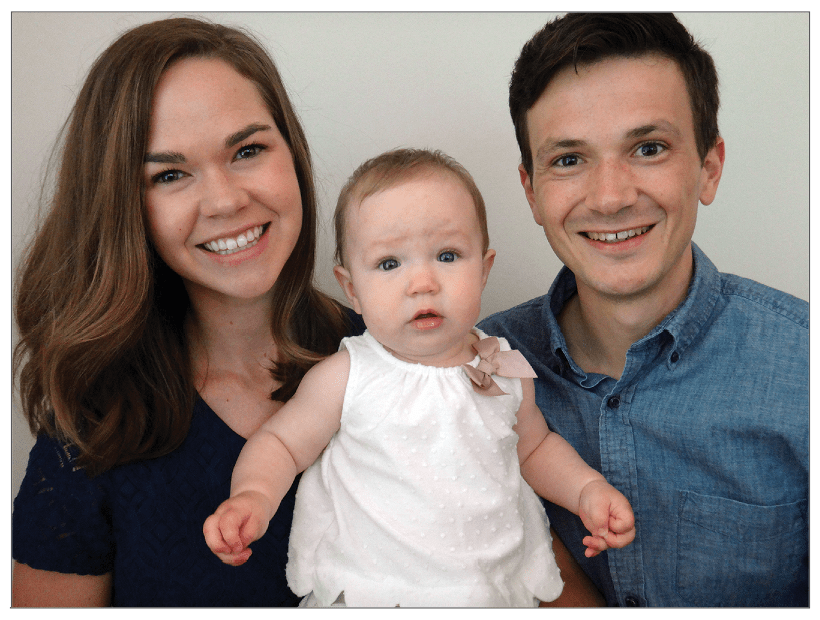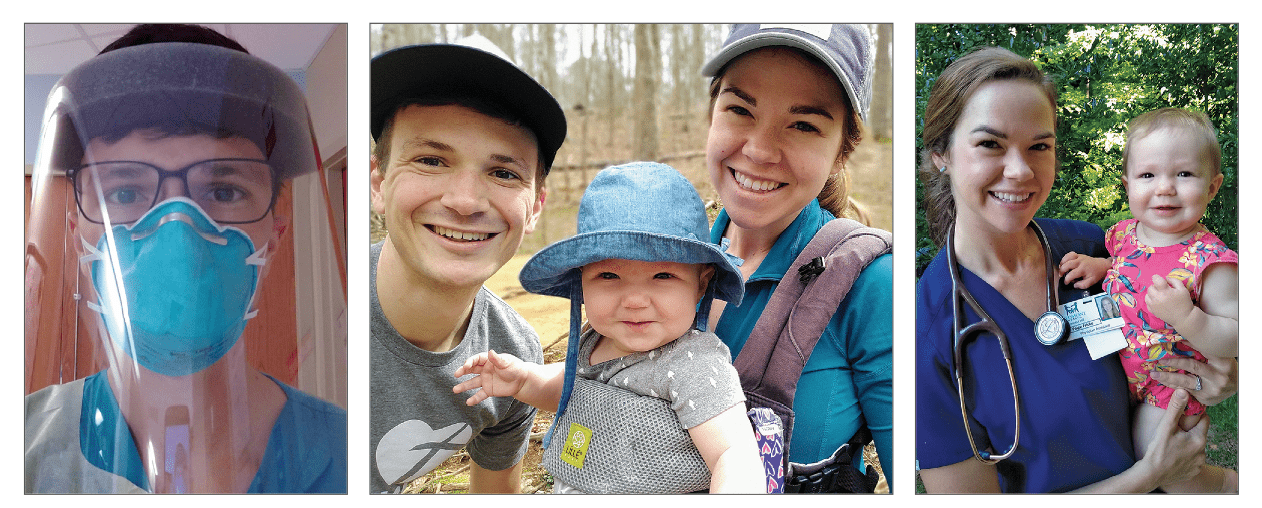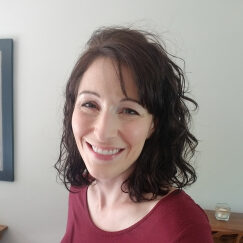 |
A husband and wife’s passion for serving leads them to the front lines of a pandemic.
It was a quiet Saturday afternoon in May. Jon and Paige Fricke were sitting in their living room as their 7-month-old daughter, Margo, napped in the other room. As they sipped their coffee, they took some time to reflect on how COVID-19 has changed their lives over the past few months—and why they both chose careers in health care.

Finding their calling
The Frickes met in high school at Luther Preparatory School, Watertown, Wis. “We thought we were going to save the world,” says Jon. “We thought we’d move to Africa or Latin America as missionaries.”
After they graduated, however, both pursued degrees in health care. Paige says her decision came from watching her parents; her father is a pastor and her mother is a piano teacher. “They both teach people to love God, love one another, and serve the world,” she says. “This inspired me to pursue a career in medicine because it allows me to do that in my own way.”
Jon says he felt the pull toward medicine after seeing his father, who is also a pastor, serve the members of his congregation who were sick or dying. He was also inspired by his mentors at Wisconsin Lutheran College (WLC), Milwaukee. “They showed me that Christians can simultaneously prioritize their faith and pursue academic excellence in scientific careers,” he says.
“Paige and I knew going into this that we could end up in the hospital or die from this. So, we wrote our wills.”
While pursuing his undergraduate degree at WLC, Jon connected with Gethsemane, a WELS church on the south side of Milwaukee, and taught English classes to immigrants. That experience helped him realize that there were many underserved populations right here in the United States that needed help.
The Frickes eventually ended up in North Carolina, where both now work in family medicine. Jon is a physician at a large academic hospital, and Paige is a physician assistant at a rural community health clinic. “We have both intentionally sought out clinics where we are working with people who are vulnerable and marginalized,” says Jon. “Many of our patients aren’t from the United States originally or don’t have health insurance. It’s challenging work and brings a sense of purpose to what we’re doing.”
A new challenge
The Frickes never anticipated that their passion for serving would put them on the front lines of the fight against a new, deadly virus. In the first few months of 2020, healthcare organizations scrambled to respond to the COVID-19 cases that were spreading quickly throughout the country. North Carolina was not immune. Jon says his hospital was hit hard because of an outbreak at a nearby meatpacking facility.
“When it started affecting people here, there were a lot of things that went through my mind in anticipation,” says Jon. “But when it came down to it, the people in this community are the people whom I’ve been called to serve. I know this is what I’m here for, what I’ve committed to do, and what I’m supposed to do.”

Paige has been able to continue providing care for her patients through virtual visits. Jon, however, is working directly with COVID-19 patients at the hospital. “It’s a new challenge, and I want to step up to the challenge—but I also don’t want to bring something home. I get nervous every time I go to work,” he says. “When I first started out [in medicine] I was thinking about what my faith will do to other people. I never thought I’d be relying on my faith to show up to work.”
Paige says she’s also relying on her faith to get her through these uncertain times. “In my daily work, I make decisions based on research and expert guidance,” she says. “Since COVID-19 is a new disease, we don’t have clear answers yet. It’s a reminder that God is in control. He is so much wiser than anything we can imagine. Ultimately this is in his hands. It’s humbling.”
Faithful service
Jon says it’s been hard treating this new, unknown disease that causes so much fear and isolation. He has stories of having to pronounce a patient dead while her family watched silently from outside the hospital window. Or the patient with COVID-19 who was crying because he was isolated in the hospital away from his young children. “I wanted to be able to go over and put my hand on his shoulder to console him, but I had already taken off my gown and gloves and didn’t have anything to protect myself,” he says. “All I could do was stand off on the side of the room, listening to him from a distance, and offer muffled words of comfort from behind an N95 mask and a face shield.”
A few Bible passages have really helped . . . including Joshua 1:9, “Do not be afraid; do not be discouraged, for the Lord your God will be with you wherever you go.”
But there have also been some uplifting moments. His first day taking care of COVID-19 patients, Jon had to tell a patient she tested positive. “She told me she was scared,” says Jon. “I took her hand, looked her in the eye, and admitted for the first time ever to a patient that I too was scared.” During the conversation the patient mentioned her faith and said her son was a minister. “My dad is a pastor, and it’s a large part of the reason I chose to go into medicine,” says Jon. “As I shared that with her, the fear and apprehension began to fade away. We were able to support each other as family in Christ.”
Although he continues to care for COVID-19 patients, Jon says he has not been pushed to the limit or forced to confront his own mortality in the same way that many ICU or emergency physicians, nurses, or respiratory therapists have had to do. “That being said, this is life-changing for any clinician who puts on an N95 mask,” he says. “Paige and I knew going into this that we could end up in the hospital or die from this. So, we wrote our wills.”
 Finding strength
Finding strength
During these difficult times, Jon and Paige say that staying connected to their church family at Gethsemane, Raleigh, N.C., has really helped them.
When their governor ordered residents to stay home, the Frickes watched Gethsemane’s church services online and participated in a virtual Bible study each week. “Those first few weeks when there was so much waiting and isolation, it was refreshing to talk to our friends,” says Jon. “And after I had a few extremely challenging weeks at work, it was great to be able to talk with the Bible study group and hear about other peoples’ lives too. It gave us that sense of normalcy.”
Jon and Paige have also been intentional about spending time together in the Word. “We have special baby devotions, we pray together, and we sing Christian songs to Margo at bedtime, like ‘I am Jesus’ Little Lamb,’ ” says Paige.
A few Bible passages have really helped Jon during this time, including Galatians 6:10, “As we have opportunity, let us do good to all people, especially those who belong to the family of believers,” and Joshua 1:9, “Do not be afraid; do not be discouraged, for the Lord your God will be with you wherever you go.”
The Frickes feel comforted knowing many people are praying for them. “It’s hard to put into words how much it means when patients say, ‘Take care of your wife and baby. We are praying for you. Stay safe,’ ” says Jon. “At a time when people are scared, challenged, and would rationally be praying for their own safety or economic livelihood, they are praying for the protection of others. To me that illustrates who we are as a family of Christians.”
He continues, “We are one small part of the greater work of the kingdom. During coronavirus, millions of Christians have had their lives turned upside down and faced life-changing moments and tragedy. Millions of Christians have also pitched in to help those who are suffering. We are just two of those people.”
Author: Alicia Neumann
Volume 107, Number 08
Issue: August 2020
- My Christian life: A pastor with brain cancer finds true strength
- My Christian life: I have depression, but Jesus has me
- My Christian life: An unexpected call to ministry later in life
- My Christian life: Breaking barriers in Milwaukee and beyond
- My Christian life: Perspectives from a lay missionary
- My Christian life: One serviceman’s faith journey
- My Christian life: Navajo shepherdess finds joy in Jesus
- My Christian life: One woman’s gratitude for being excommunicated
- My Christian life: Making music as a family
- My Christian life: Engaging the church’s youth
- My Christian life: Leading as a Christian in the business world
- My Christian life: Fulfilling physical and spiritual needs
- My Christian life: Raising a child with special needs
- My Christian life: Premature twins defy medical odds
- My Christian life: College student recovers after rare diagnosis
- My Christian life: The reality of being a Vietnam veteran
- My Christian life: When vocation and ministry collide
- My Christian life: From Air Force sergeant to staff minister
- My Christian life: Faith provides firm foundation after cancer diagnosis
- My Christian life: From prospect to pastor
- My Christian life: The unique path of embryo adoption
- My Christian life: Turning tragedy into blessing
- My Christian life: A Malawian Christian committed to serving others
- My Christian life: Pen pal shares faith with prisoners
- My Christian life: Born deaf to a hearing family
- My Christian life: A single mother finds a new beginning
- My Christian life: Finding real Christmas joy while in the hospital
- My Christian life: Holding up the prophets’ hands
- My Christian life: One man’s battle with anxiety
- My Christian life: Heart transplant inspires a life of service
- My Christian life: Finding true peace through Psalm 23
- My Christian life: An incredible harp-playing journey
- My Christian life: Highlighting the Scriptures through art
- My Christian life: Serving in retirement as a vacancy pastor
- My Christian life: A man of truth
- My Christian life: The sign maker
- My Christian life: Once a detective, now a pastor
- My Christian life: A Ukrainian mother chooses life
- My Christian life: Teen faces difficult medical diagnosis
- My Christian life: Music as a companion on life’s journey
- My Christian life: WELS nurse lives out faith through her vocation
- My Christian life: A teacher retires full of memories
- My Christian life: On the front lines of a pandemic
- My Christian life: Dealing with mental illness
- My Christian life: Camp BASIC
- My Christian life: Battling cancer as a teenager
- My Christian life: Spencer Beach
- My Christian life: Mission opportunities in South Asia
- My Christian life: Haiti adoptions





